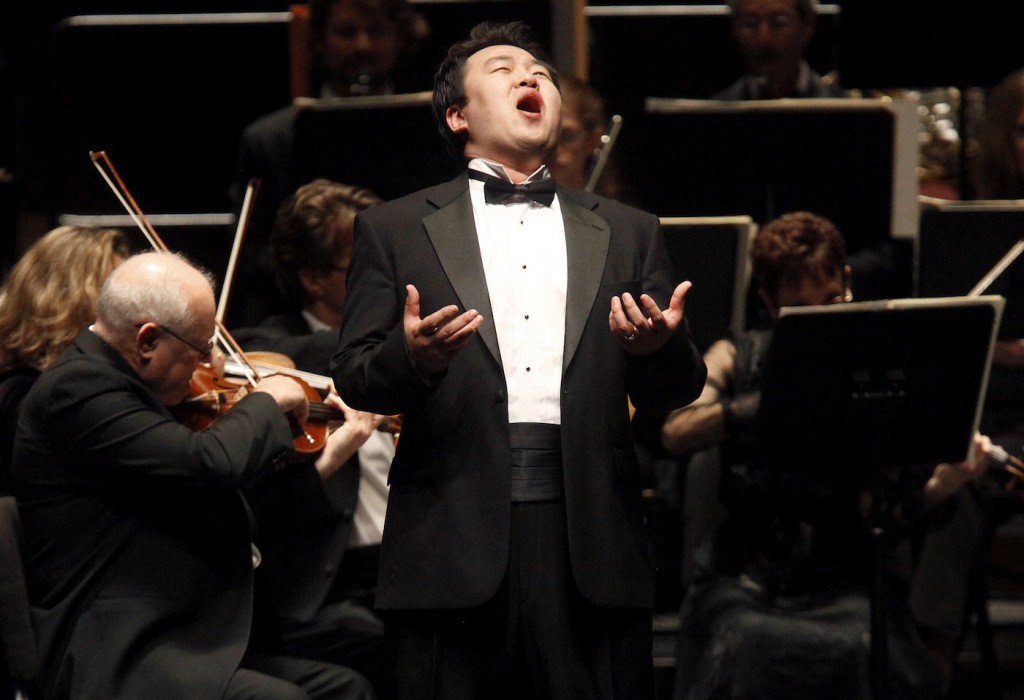Low voices wind up the top winners in Palm Beach Opera’s Vocal Competition

Korean baritone Joo Won Kang was the top winner at the Palm Beach Opera Vocal Competition Sunday at the Kravis Center.
Tenors and sopranos may have the glamour roles in opera, but it was the lower voice categories that most impressed the judges Sunday at the Grand Finals Concert of the Palm Beach Opera Vocal Competition.
Judges awarded the top three prizes in each division to baritones, mezzo-sopranos and a bass-baritone, in the 42nd annual awards concert, held at the Kravis Center in West Palm Beach.
Taking top prize in the Advanced Division (ages 24-30) was the baritone Joo Won Kang, 29, who studied voice in South Korea before attending the Manhattan School of Music. He sang Vision fugitive from Massenet’s rarely heard opera Hérodiade, bringing it off with smooth phrasing and a dark-hued voice. The award comes with $6,000, with lesser amounts for the lower prize winners. Second prize went to Margaret Mezzacappa, a mezzo-soprano from Euclid, Ohio, whose richly colored voice was well displayed in Voce di donna from Ponchielli’s La Gioconda.
Taking top prize in the Junior Division (ages 18-23) was Brandon Cedel, a bass-baritone from Hershey, Pa., who is studying for a master’s degree at the Curtis Institute of Music in Philadelphia. He sang Vi ravviso o luoghi ameni from Bellini’s La Sonnambula, displaying a big, appealing voice and a professional level of assurance in his singing that was lacking in many of the other performers. His prize was $4,500. Second prize went to Joseph Lattanzi, a baritone from Mableton, Ga., who brought a full, rounded tone and nimble confidence to the richly ornamented melody of Ah! Per sempre from Bellini’s I Puritani.
The rest of the singers were a mixed bag. Several were promising, although some voices clearly needed a lot of work.
In the Advanced Division, mezzo-soprano Laura Wilde, of Watertown, S.D., took third prize, bringing a warm tone, agility and stellar high notes to Sein wir wieder gut! from Strauss’ Ariadne auf Naxos. The soprano Suzanne Vinnik gave a dramatic account of Violetta’s stream of consciousness aria È strano…Sempre libera, with coloratura that was generally on the money, with particularly impressive runs toward the end. She took fourth prize yet clearly made a hit with the Kravis Center patrons, nabbing the Audience Favorite Award.
Taking fifth prize was John Holiday, whose countertenor voice varied from metallic and edgy to rich and warm in his uneven account of Crude furie degli orridi abissi from Handel’s Serse. The soprano Jeanine De Bique, of Trinidad and Tobago, placed a surprising sixth, despite displaying vocal depth, genuine musicianship and technical agility in Padre, germani, addio! from Mozart’s Idomeneo.
R. Kenneth Stavert, of Fullerton, Calif., who placed seventh, achieved the most convincing characterization of the evening, in a Figaro that was witty and cocky without overdoing it, although vocally his baritone voice was less impressive than some of the others.
In the Junior Division, baritone Emmett O’Hanlon’s commanding style compensated for some vocal weaknesses in Hai gia vinta la cause?…Vedro, mentr’io sospiro, earning him third prize.
The Miami soprano Betsy Diaz, who placed fourth, deployed a big voice, perhaps too big, for Puccini’s Si, mi chiamano Mimì, overpowering the delicate aria with excessive vibrato and volume. Tenor Marco Stefani, of Pleasanton, Calif., brought an agile but small voice to Puccini’s Avete torto!…Firenze è come un albero fiorito from Gianni Schicchi, sometimes allowing his voice to become inaudible under the orchestra.
A missing element — possibly because of the lack of staging and the rapid parade of performers — was the sense of dramatic engagement with the music. Although a few singers brought something approaching vivid characterizations to their performances, there was an undertone of artistic blandness to many of the performances, even among those on a vocally high level.
Of course, you can go too far with the dramatics, as the soprano Danielle Adams illustrated in Mein Herr Marquis from Johann Strauss’ Die Fledermaus, an inelegant, over-the-top performance that overdid the coquettish side of the aria.
The singers were accompanied by the Palm Beach Opera Orchestra, which did its usual fine job, conducted by Greg Ritchey. The judges were Lenore Rosenberg, associate artistic administrator of the Metropolitan Opera; Christina Scheppelmann, director of artistic operations for Washington National Opera; Dona Vaughn, artistic director of PORTopera in Portland, Maine; and Ken Benson, a former vice president of Columbia Artists Management.
Posted in News
Leave a Comment
Mon Apr 11, 2011
at 11:48 am
No Comments